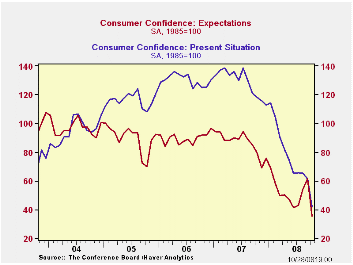 Global| Oct 28 2008
Global| Oct 28 2008Consumer Confidence Collapses To Record Low
by:Tom Moeller
|in:Economy in Brief
Summary
Reflecting turbulence in the financial markets, the Conference Board reported that its October index of consumer confidence collapsed by more than one-third m/m to a record low level. The latest index level of 38.0, off by two-thirds [...]

Reflecting turbulence in the financial markets, the Conference Board reported that its October index of consumer confidence collapsed by more than one-third m/m to a record low level. The latest index level of 38.0, off by two-thirds from last year, followed a level of 61.4 during September. Consensus expectations had been for a lesser m/m decline to a reading of 52.0.
During the last ten years there has been a 79% correlation between the level of consumer confidence and the y/y change in real consumer spending.
This month's decline reflected a 42.3% m/m plunge in the
expectations component of the index. The index was at a record low
level and the October drop followed increases during the prior three
months.
Fewer jobs were seen by 41.5% of respondents, the highest since 1980. Only 4.4% planned to buy an automobile and just 3.3% planned to buy carpet. Both of these percentages set the record low for the series. Twenty six percent of respondents planned to buy a major appliance within six months, near the fifteen year low. Only 2.7% of respondents planned to buy a home within six months, down from the high near 5% in 1999.
The percentage of respondents expecting business conditions to worsen in six months jumped to 36.6%, the highest level since the credit crunch of 1980. Only 9.9% expected improvement in conditions.
Down by nearly one-third m/m, the present conditions index fell to the lowest level since 1992. Jobs were seen as hard to get by 37.2% of respondents, the highest since 1993 and jobs were seen as plentiful by just 8.9%. Business conditions were seen as good by just 9.2%, the lowest since 1991. Those who thought it bad rose to 38.3%, also the highest since 1992.
Expectations for the inflation rate in twelve months surprisingly rose to 6.9%, the highest level since July.
The Enduring Challenge of Concentrated Poverty: Case Studies from Communities Across the U.S. from the U.S. Federal Reserve Board is available here.
| Conference Board (SA, 1985=100) | October | September | Y/Y % | 2007 | 2006 | 2005 |
|---|---|---|---|---|---|---|
| Consumer Confidence Index | 38.0 | 61.4 | -60.1 | 103.4 | 105.9 | 100.3 |
| Present Situation | 41.9 | 61.1 | -64.5 | 128.8 | 130.2 | 116.1 |
| Expectations | 35.5 | 61.5 | -55.6 | 86.4 | 89.7 | 89.7 |
Tom Moeller
AuthorMore in Author Profile »Prior to joining Haver Analytics in 2000, Mr. Moeller worked as the Economist at Chancellor Capital Management from 1985 to 1999. There, he developed comprehensive economic forecasts and interpreted economic data for equity and fixed income portfolio managers. Also at Chancellor, Mr. Moeller worked as an equity analyst and was responsible for researching and rating companies in the economically sensitive automobile and housing industries for investment in Chancellor’s equity portfolio. Prior to joining Chancellor, Mr. Moeller was an Economist at Citibank from 1979 to 1984. He also analyzed pricing behavior in the metals industry for the Council on Wage and Price Stability in Washington, D.C. In 1999, Mr. Moeller received the award for most accurate forecast from the Forecasters' Club of New York. From 1990 to 1992 he was President of the New York Association for Business Economists. Mr. Moeller earned an M.B.A. in Finance from Fordham University, where he graduated in 1987. He holds a Bachelor of Arts in Economics from George Washington University.
More Economy in Brief
 Global| Feb 05 2026
Global| Feb 05 2026Charts of the Week: Balanced Policy, Resilient Data and AI Narratives
by:Andrew Cates






